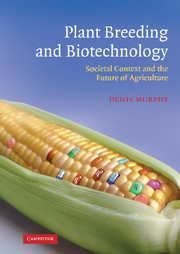Book contents
- Frontmatter
- Contents
- Preface
- Acknowledgements
- Using this book
- Nomenclature and terminology
- Abbreviations and glossary
- Introduction
- Part I The science of plant breeding
- Part II The societal context of plant breeding
- Part III Turmoil and transition: the legacy of the 1980s
- 7 Resurgence of the private sector
- 8 Emergence of a new crop improvement paradigm
- 9 Decline of the public sector
- 10 Reaping the consequences
- Part IV The agbiotech paradigm
- Part V Increasing global crop production: the new challenges
- Part VI Plant breeding in the twenty-first century
- Notes
- References
- Index
9 - Decline of the public sector
Published online by Cambridge University Press: 07 May 2010
- Frontmatter
- Contents
- Preface
- Acknowledgements
- Using this book
- Nomenclature and terminology
- Abbreviations and glossary
- Introduction
- Part I The science of plant breeding
- Part II The societal context of plant breeding
- Part III Turmoil and transition: the legacy of the 1980s
- 7 Resurgence of the private sector
- 8 Emergence of a new crop improvement paradigm
- 9 Decline of the public sector
- 10 Reaping the consequences
- Part IV The agbiotech paradigm
- Part V Increasing global crop production: the new challenges
- Part VI Plant breeding in the twenty-first century
- Notes
- References
- Index
Summary
Habemus publice egestatem, privatim opulentiam (We have public want amidst private plenty)
Sallust (86–34 BCE) Conspiracy of CatalineIntroduction
The public sector paradigm of crop improvement has been spectacularly successful in feeding the unprecedented growth of human populations over the past century. The immense achievements of the Green Revolution during the 1960s and 1970s were largely built on the public-good breeding efforts of the previous half century. But just as these achievements were coming to fruition, a new, and superficially attractive, private sector paradigm of crop improvement emerged. The timing of this renaissance of private enterprise could not have come at a worse time for public sector plant science, especially in those industrialised countries that so vigorously privatised many state assets, including centres of scientific research, in the 1980s and 1990s. In no country were the resulting cutbacks in public sector plant breeding more far reaching than in the UK. In a period of a little over a decade, the UK lost virtually all of its public plant breeding infrastructure and much of the related scientific expertise. This process was duly exported to other nations and has even engulfed some developing countries. In December 1989, I was appointed as Head of one of the three departments of the former Plant Breeding Institute (PBI) that stayed in the public sector while the rest of the organisation was privatised.
- Type
- Chapter
- Information
- Plant Breeding and BiotechnologySocietal Context and the Future of Agriculture, pp. 126 - 136Publisher: Cambridge University PressPrint publication year: 2007



